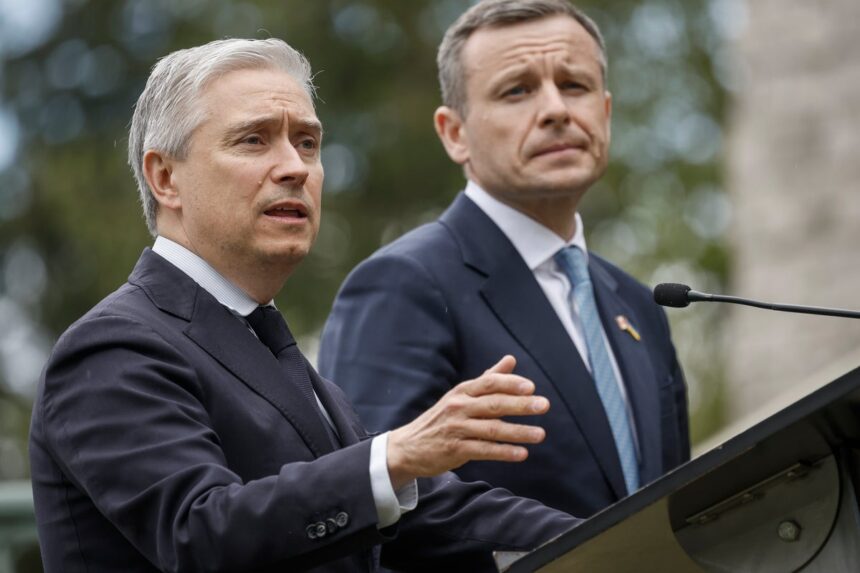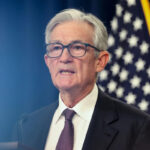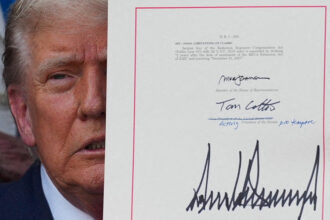Diplomatic fissures erupted at the G7 finance ministers’ summit in Stresa, Italy this weekend as the looming specter of Donald Trump’s potential return to power sent shockwaves through global economic discussions. Finance leaders from the world’s most advanced economies found themselves increasingly divided over how to address the former president’s aggressive trade stance and its implications for international commerce.
The summit, which traditionally serves as a platform for economic cooperation, instead revealed growing anxiety as Canadian Finance Minister Chrystia Freeland directly challenged America’s strategy toward her country. “Let me be very clear: Canada is not a national security threat to the United States,” Freeland asserted, responding to the Trump-era justification for imposing tariffs on Canadian goods.
Her pointed remarks came after Trump’s recently appointed economic advisor, Scott Bessent, signaled that a second Trump administration would leverage tariffs not only against China but potentially against allies including Canada and the European Union. This provocative stance threatens to disrupt decades of carefully constructed trade relationships among Western democracies.
The G7 finance ministers’ final communiqué attempted to paper over these divisions with vague statements supporting “free and fair trade” while acknowledging the need for “secure supply chains.” However, the diplomatic language barely concealed the fundamental disagreements that emerged during the three-day gathering at Lake Maggiore.
U.S. Treasury Secretary Janet Yellen found herself in the uncomfortable position of defending the Biden administration’s trade policies while her counterparts openly worried about a potential Trump return. “We recognize that allies need to work together,” Yellen stated, “but each country must also protect its economic interests.”
European officials expressed particular concern about Trump’s threatened 10% across-the-board tariffs. German Finance Minister Christian Lindner warned that such measures would trigger “a dangerous spiral of retaliation” that could severely damage the global economy. “We cannot afford another trade war among friends,” he emphasized during a panel discussion.
The summit exposed deeper structural tensions about the future of global trade. While all G7 members verbally committed to open markets, each delegation departed with contingency plans for a more protectionist world. Canadian officials privately indicated they are developing strategies to diversify trade relationships beyond North America, while French representatives pushed for greater “European strategic autonomy” in key industries.
Behind closed doors, discussions centered on whether the multilateral trading system established after World War II could survive another Trump presidency. According to sources familiar with the talks, Japanese Finance Minister Shunichi Suzuki urged his counterparts to strengthen the World Trade Organization as a bulwark against unilateral actions, but found limited enthusiasm for institutional reform.
The financial markets have already begun pricing in this uncertainty, with currency traders reporting increased volatility in the Canadian dollar and euro following Bessent’s comments. “Investors are hedging against the possibility of new trade barriers,” explained Morgan Stanley analyst Helena Robertson. “This creates a self-reinforcing cycle of economic insecurity.”
For Canada, the stakes are particularly high given its deep economic integration with the United States. Nearly 75% of Canadian exports flow to its southern neighbor, making it uniquely vulnerable to American trade policy shifts. Freeland’s uncharacteristically direct language reflected this existential concern.
As ministers departed the picturesque Italian lakeside venue, the facade of G7 unity had clearly cracked. While the official statement emphasized “shared values and cooperative approaches,” the sideline conversations revealed a group of nations actively preparing for economic conflict among allies.
What remains to be seen is whether these diplomatic tensions will translate into concrete policy changes, or if they represent merely posturing ahead of November’s U.S. presidential election. Either way, the landscape of international economic cooperation appears increasingly fragile. In a world where even closest allies view each other with suspicion, can the global trading system that has underpinned decades of prosperity survive intact?

























